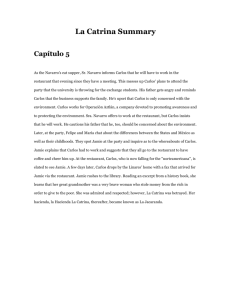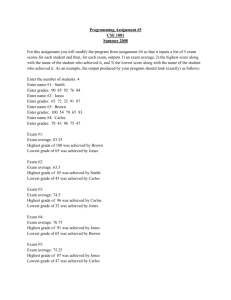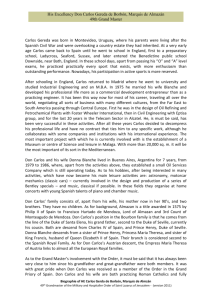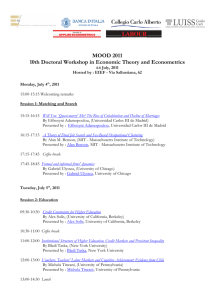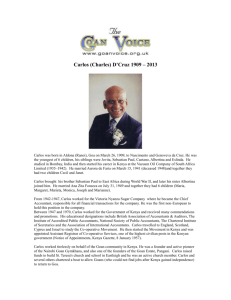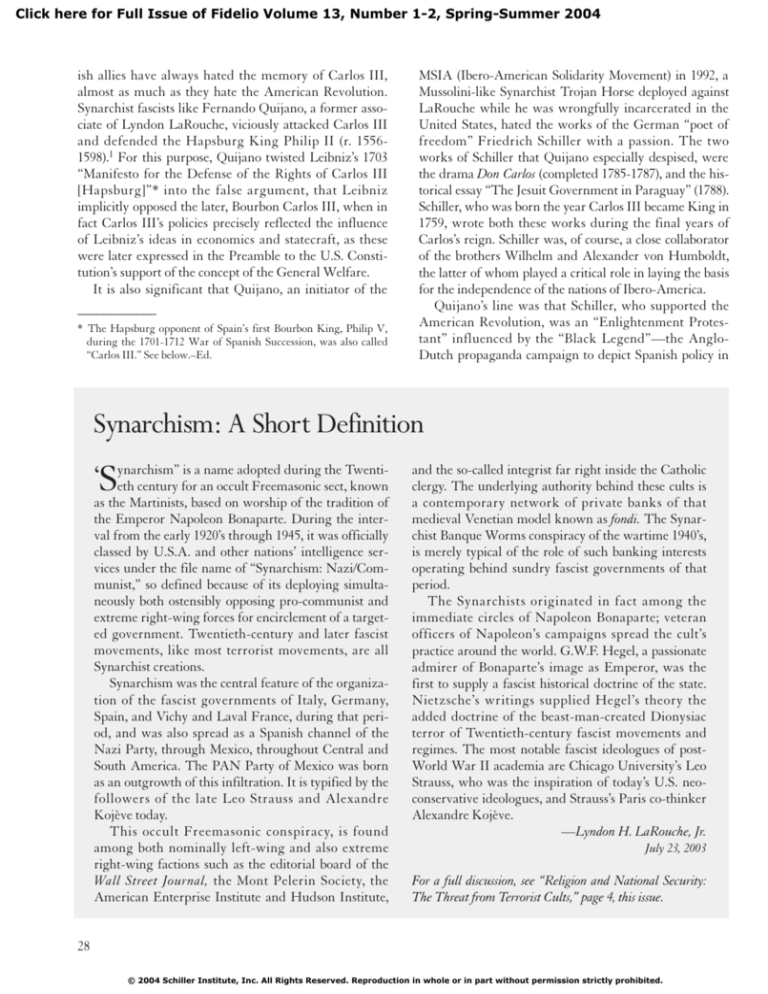
Click here for Full Issue of Fidelio Volume 13, Number 1-2, Spring-Summer 2004
ish allies have always hated the memory of Carlos III,
almost as much as they hate the American Revolution.
Synarchist fascists like Fernando Quijano, a former associate of Lyndon LaRouche, viciously attacked Carlos III
and defended the Hapsburg King Philip II (r. 15561598).1 For this purpose, Quijano twisted Leibniz’s 1703
“Manifesto for the Defense of the Rights of Carlos III
[Hapsburg]”* into the false argument, that Leibniz
implicitly opposed the later, Bourbon Carlos III, when in
fact Carlos III’s policies precisely reflected the influence
of Leibniz’s ideas in economics and statecraft, as these
were later expressed in the Preamble to the U.S. Constitution’s support of the concept of the General Welfare.
It is also significant that Quijano, an initiator of the
____________
* The Hapsburg opponent of Spain’s first Bourbon King, Philip V,
during the 1701-1712 War of Spanish Succession, was also called
“Carlos III.” See below.–Ed.
MSIA (Ibero-American Solidarity Movement) in 1992, a
Mussolini-like Synarchist Trojan Horse deployed against
LaRouche while he was wrongfully incarcerated in the
United States, hated the works of the German “poet of
freedom” Friedrich Schiller with a passion. The two
works of Schiller that Quijano especially despised, were
the drama Don Carlos (completed 1785-1787), and the historical essay “The Jesuit Government in Paraguay” (1788).
Schiller, who was born the year Carlos III became King in
1759, wrote both these works during the final years of
Carlos’s reign. Schiller was, of course, a close collaborator
of the brothers Wilhelm and Alexander von Humboldt,
the latter of whom played a critical role in laying the basis
for the independence of the nations of Ibero-America.
Quijano’s line was that Schiller, who supported the
American Revolution, was an “Enlightenment Protestant” influenced by the “Black Legend”—the AngloDutch propaganda campaign to depict Spanish policy in
Synarchism: A Short Definition
is a name adopted during the Twenti‘Synarchism”
eth century for an occult Freemasonic sect, known
as the Martinists, based on worship of the tradition of
the Emperor Napoleon Bonaparte. During the interval from the early 1920’s through 1945, it was officially
classed by U.S.A. and other nations’ intelligence services under the file name of “Synarchism: Nazi/Communist,” so defined because of its deploying simultaneously both ostensibly opposing pro-communist and
extreme right-wing forces for encirclement of a targeted government. Twentieth-century and later fascist
movements, like most terrorist movements, are all
Synarchist creations.
Synarchism was the central feature of the organization of the fascist governments of Italy, Germany,
Spain, and Vichy and Laval France, during that period, and was also spread as a Spanish channel of the
Nazi Party, through Mexico, throughout Central and
South America. The PAN Party of Mexico was born
as an outgrowth of this infiltration. It is typified by the
followers of the late Leo Strauss and Alexandre
Kojève today.
This occult Freemasonic conspiracy, is found
among both nominally left-wing and also extreme
right-wing factions such as the editorial board of the
Wall Street Journal, the Mont Pelerin Society, the
American Enterprise Institute and Hudson Institute,
and the so-called integrist far right inside the Catholic
clergy. The underlying authority behind these cults is
a contemporary network of private banks of that
medieval Venetian model known as fondi. The Synarchist Banque Worms conspiracy of the wartime 1940’s,
is merely typical of the role of such banking interests
operating behind sundry fascist governments of that
period.
The Synarchists originated in fact among the
immediate circles of Napoleon Bonaparte; veteran
officers of Napoleon’s campaigns spread the cult’s
practice around the world. G.W.F. Hegel, a passionate
admirer of Bonaparte’s image as Emperor, was the
first to supply a fascist historical doctrine of the state.
Nietzsche’s writings supplied Hegel’s theory the
added doctrine of the beast-man-created Dionysiac
terror of Twentieth-century fascist movements and
regimes. The most notable fascist ideologues of postWorld War II academia are Chicago University’s Leo
Strauss, who was the inspiration of today’s U.S. neoconservative ideologues, and Strauss’s Paris co-thinker
Alexandre Kojève.
—Lyndon H. LaRouche, Jr.
July 23, 2003
For a full discussion, see “Religion and National Security:
The Threat from Terrorist Cults,” page 4, this issue.
28
© 2004 Schiller Institute, Inc. All Rights Reserved. Reproduction in whole or in part without permission strictly prohibited.

